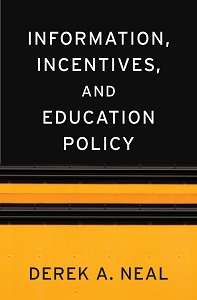Information, Incentives, and Education Policy By Derek A. Neal, Cambridge, Mass.: Harvard University Press, 2018, 224 Pages
Human capital — the collection of traits that improve people’s productive capacities, such as health, skills, knowledge, and habits — is a primary driver of economic growth at the aggregate level and earnings potential at an individual level. But how do people acquire human capital — and what can policymakers do to facilitate that acquisition? One of the most significant ways is formal education.
In Information, Incentives, and Education Policy, Derek Neal, an economist at the University of Chicago, explores how K-12 education might be provided most efficiently. To address that issue, Neal first examines the performance of existing public schools, which he often finds wanting due to inefficient personnel policies and waste, and then assesses three widely proposed reforms.
He first discusses assessment-based incentive (ABI) systems, which reward or penalize educators based on how their students perform on standardized tests. He notes that the "teacher effects" literature has identified three facts about the determinants of test scores. First, among a population of students with similar records of past achievement who attend schools with comparable resources, expected test scores differ systematically across classrooms. Second, much of those differences can be predicted by the performance of students taught previously by the teachers assigned to each classroom. Third, researchers have not been able to identify the characteristics of new teachers that will foster higher achievement among their students.
Neal argues that ABI systems, in principle, show promise but can fail to deliver for several reasons. There have been numerous cases of corruption, in which students’ test scores have been manipulated by teachers and principals. Also, ABI systems can encourage instructors to teach to the test rather than devote class time to more productive uses. In addition, teachers may neglect students who they perceive as having little chance of passing the test in favor of other students. Neal and Gadi Barlevy of the Chicago Fed have proposed an ABI scheme called Pay for Percentile (PFP), which defies succinct explanation, but which they argue would avoid those pitfalls. Even if PFP were adopted, though, it still would not necessarily foster other important skills and character traits, such as acting more maturely and responsibly. Some have argued that school choice proposals, including charter schools and voucher programs, would allow parents to choose schools that seem to perform well along those dimensions.
Charter schools, the second reform he considers, are schools that the government authorizes and pays for but does not operate. There are a large number of charter schools across the country, which have been the subject of much research. Neal argues that performance among charter schools can be quite variable and what has been described as the "No Excuses" model has often yielded significant returns, particularly in urban schools with significant minority populations. He cites work by Roland Fryer Jr., an economist at Harvard University, who has written that the No Excuses approach can be characterized by five broad tenets: (1) an increase in instructional time, including longer school days, longer school years, and classes on Saturdays; (2) changes in the human capital in schools, including rigorous screening of school principals, resources dedicated to teacher training, and frequent feedback given to teachers on the quality of their instruction; (3) significant time devoted to tutoring; (4) regular assessments of students’ progress and updated performance goals based on those assessments; and (5) a culture of high expectations, including clearly stated objectives, with both school administrators and students’ parents signing agreements to honor the policies designed to ensure that students succeed.
The third reform is voucher programs that provide parents with funds they could use to send their children to any school they choose, public or private, and perhaps would allow parents to provide additional personal funds to meet any shortfall between the amount of the voucher and the tuition rate. Neal has less to say about voucher programs than he does about ABI systems or charter schools, in part because there is less evidence to draw on. He is generally favorable toward them, though he worries about the inequality of educational outcomes they may produce and argues that their adoption faces large political barriers.
In the end, Neal argues that optimal education policies might draw from all three reforms discussed, producing a "system of regulated competition among sets of education providers that education authorities deem eligible to receive public funds." He sees a parallel with the Medicare system, which allows beneficiaries to receive care at public or private hospitals, but the providers are licensed and treatments deemed wasteful are not covered. It may seem like a less than satisfying proposal to some — including both those who see such reforms as undermining a system they believe works reasonably well now and those who would like to see schooling separated from the state altogether — but solutions to issues this complex often are.




